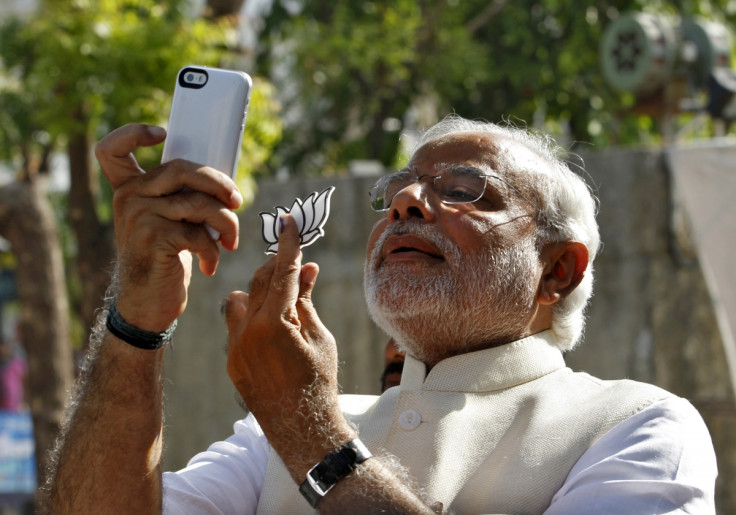India Election 2014: How Does Would-be Indian PM Modi Match Up To Thatcher, Abe, Deng and Hitler?

Narendra Modi will today be confirmed as the prime minister of the world's largest democracy, after an election on a scale that's never been seen before.
The Bharatiya Janata Party (BJP) is all set to form the next government in India as the latest lead positions indicate the right wing Hindu nationalist party and its allies are heading to win more than 300 seats in the 543-member Lok Sabha, the lower house of parliament.
In the weeks through which India has been visiting the polls, political punters around the world have been straining to make sense of Modi. His fascinating life story and his daily routine – seemingly at odds with his status as a powerful political figure – have captivated millions.
But mostly, people have wondered which world leader he is most comparable to. And the answer varies, depending on the nationality of the commentator.
For the reformatory work he undertook while at the helm of his home state of Gujarat, Modi has compared to Chinese reformer Deng Xiaoping, who, after inheriting a nation plagued by institutional ineptitude, introduced the economic reforms that have directly resulted in its dramatic ascent. Much of this was done through investment, which should be a cornerstone of Modi's policy.
Mike Jakeman, global analyst at the Economist Intelligence Unit, tells IBTimes UK: "Both Modi and Congress have promised to curb inflation and revitalise India's fledgling manufacturing sector; both also plan to revise India's creaking infrastructure by constructing a high-speed rail network, building 100 new cities and expanding industrial corridors."
For the boldness in his expected economic policy reform, he's been compared with Shinzo Abe, Japan's leader. The 'three arrows' of Abenomics is aimed at introducing fiscal stimulus, monetary easing and structural reforms into Japan's ailing economy. While the jury is still out on the programme's success, the ambition can't be doubted.
The scale of Modi's reforms may well be hampered by the relative weakness of the coalition he has to form.
"That is why the BJP's margin of victory (in addition to the victory itself) is crucial in determining India's economic future," Jakeman says.
Renowned Indian political commentator Deepak Lal even wondered if Modi's approach would be more like that of Hitler than anyone else, musing: "Like Hitler, Modi is an auto-didact, who since he implicitly repudiated his child marriage has had no personal life, and is a charismatic speaker, who has run a highly personalised near-presidential campaign."
Comparing with Thatcher
In the UK, though, there's no doubting who Modi has been aligned with in the eyes of the commentariat: Margaret Thatcher. Like her or loathe her, Thatcher left an indelible impact on the political psyche: anyone that even slightly resembles her policymaking is going to be big news.
The similarities begin on a frivolous level. As a youth, Modi helped his father sell tea at a railway station, before starting his own tea stall with his brother near the bus depot. Thatcher's father Alfred, too, was a grocer, starting off as an apprentice in a greengrocers before going on to own a number of his own stores.
As politicians, the pair share a number of defining traits. Most notably, their dislike of red tape and propensity for privatisation.
Thatcher's reign will always be remembered for her auctioning off of state resources, her love of small government and deregulation of the financial sector.
Given the challenges Modi faces as he comes to power, it would be unsurprising to see him follow some of these strategies. But his rhetoric implies that he will not pursue them in Thatcher's no-holds barred ideological manner.
Deepak Kanth, a former Citigroup banker and volunteer on Modi's campaign trail, said he expects the incoming PM to replicate Thatcher's Big Bang of financial regulation of 1986 in India's infrastructure sector.
"What Thatcher did with financial market reforms, you can expect a similar thing with infrastructure in India under Modi," he said.
Modi himself has implied that his BJP government will favour a form of public private partnership, whereby government partners with the private sector. To the PPP mix, Modi has said he will add an extra 'P': people, insisting that the electorate must be consulted every step of the way.
Modi has vowed to slash through India's notoriously red-tape heavy business environment. In the run up to the election, he said: "It is time that we actually need to do away with many existing laws in the country. Trade and commerce need to be brought to the centre of India's foreign missions' agenda."
However, most are sceptical as to how fast this rhetoric will hold in practice. "Comparisons with Reagan and Thatcher are highly premature," says Jakeman. "He has prioritised 'toilets over temples', but he is representing a Hindu-nationalist party. He would certainly be a more palatable PM to non-Hindus if he focused on infrastructure rather than religion."
Not quite the Iron Lady, then, but perhaps the biggest reformer India has seen for many years.
© Copyright IBTimes 2024. All rights reserved.






